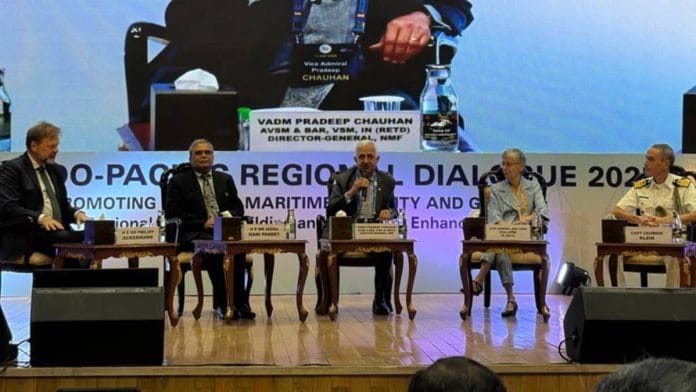New Delhi: At the Indo-Pacific Regional Dialogue 2025 in New Delhi Tuesday, Germany’s Ambassador to India, Philipp Ackermann, said the nation was “ready, more than ever, to break new ground with India, whether in the development of modern defence systems, training or logistics”.
He stressed that maritime cooperation between the two countries “aims to protect our open societies from security risks, strengthen the resilience of global supply chains, and defend shared principles—freedom of the seas, sovereignty of states and respect for international law”.
He added that Germany and India are linked by a strategic partnership built on shared values, mutual trust, and a common will to shape the future of the region together.
“This partnership is becoming increasingly important in the face of global change, from maritime security to cyber security to defence. Both our navies are in the process of doing something big, very, very soon. Discussions on joint projects, transfer of technology, and industrial cooperation reflect our mutual interest in deeper, more integrated security policies,” Ackermann said.
His comments come as Germany’s ThyssenKrupp Marine Systems (TKMS) partners with Mazagon Dock Shipbuilders Limited (MDL) for a multibillion-dollar Indian Navy contract under the long-delayed Project 75 (India) or P75I—a programme to build six next-generation conventional submarines equipped with Air Independent Propulsion (AIP) System, as reported by ThePrint.
Both Berlin and Madrid have sought a government-to-government framework, similar to the 2016 Rafale fighter jet deal between India and France, while Spain’s Navantia has teamed up with Larsen & Toubro (L&T) for P75I.
In 2024, an Indian Navy delegation visited Germany to evaluate TKMS’s AIP technology that allows submarines to remain underwater for extended periods.
The submarine programme, conceived in 2000, has been repeatedly delayed due to shifting strategic partnership rules and the lack of a proven AIP system. France’s Naval Group, which built six Scorpene-class submarines for India, was unable to participate in P75I for that reason.
India’s indigenous AIP system, being developed by the Defence Research and Development Organisation (DRDO), remains behind schedule.
Despite Europe’s preoccupation with the war in Ukraine, Germany is visibly expanding its security footprint in the Indo-Pacific.
“We in Germany consider this region key to global stability, resilience and a rules-based international order,” Ackermann said. He reminded that Germany’s 2020 Indo-Pacific Guidelines signalled a “commitment to partnership, presence and responsibility in the region”.
Acknowledging Europe’s strained resources, the envoy added: “We have a brutal war in our neighbourhood that keeps us very busy, yet we must show presence and presence will go on.”
He hinted at plans for more German naval deployments alongside India, noting that a German frigate last year transited the Taiwan Strait, calling it “a clear message of international law and freedom of navigation”.
“The Indo-Pacific,” he said, “is not just a geopolitical region, it is a reflection of our shared future.”
(Edited by Nida Fatima Siddiqui)
Also Read: India, UK sign £350 mn deal for Martlet. What are these Lightweight Multirole Missiles






